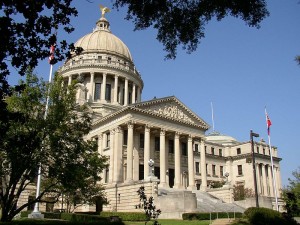 A number of atheist organizations are seeking to remove long-standing language from seven state Constitutions that bans secularists from holding public office.
A number of atheist organizations are seeking to remove long-standing language from seven state Constitutions that bans secularists from holding public office.
The mandates were all written within 100 years following the nation’s founding, and outline that as a prerequisite for serving in government, the individual must believe in God.
“[N]o religious test ought ever to be required as a qualification for any office of profit or trust in this State, other than a declaration of belief in the existence of God,” the Constitution of Maryland reads.
“No person who denies the being of God, or a future state of rewards and punishments, shall hold any office in the civil department of this state,” the Tennessee Constitution outlines.
“No religious test shall ever be required as a qualification to any office, or public trust, in this State; nor shall any one be excluded from holding office on account of his religious sentiments, provided he acknowledge the existence of a Supreme Being,” the Constitution of Texas mandates.
Some states ban residents from also serving on juries if they deny God.
“No person who denies the being of a God shall hold any office in the civil departments of this State, nor be competent to testify as a witness in any court,” the Arkansas Constitution declares.
Other states that ban atheists from serving in government positions include Mississippi, North and South Carolina, and Texas.
Pennsylvania’s Constitution has similar language, but is not seen by some as an outright ban on secularists.
“No person who acknowledges the being of a God and a future state of rewards and punishments shall, on account of his religious sentiments, be disqualified to hold any office or place of trust or profit under this Commonwealth,” it reads.
In light of the historical bans, several atheist and church-state separation groups are seeking to remove the language, which they view as being “outdated provisions from a more bigoted time.”
“If it was on the books that Jews couldn’t hold public office, or that African-Americans or women couldn’t vote, that would be a no-brainer,” Todd Steiffel of the Openly Secular Coalition, which is leading the effort to have the bans repealed, told reporters. “You’d have politicians falling all over themselves to try to get it repealed. Even if it was still unenforceable, it would still be disgraceful and be removed. So why are we different?”
“If these affected Jews, Catholics, Mormons, they would have been removed long ago,” Rob Boston of Americans United for Separation of Church and State commented to VICE News. “Atheists are still pretty unpopular in the US. They scrap the bottom along with Muslims here.”
While the bans generally have not been enforced in decades, in 2009, writer Cecil Bothwell was eventually allowed to serve on the Asheville, North Carolina City Council after some spoke out against his election because of the state’s constitutional requirements.
Most atheists argue that the founding of the nation was secular, but some may see the historical constitutional mandates as evidence otherwise.
“[L]et us not forget the religious character of our origin,” American statesman Daniel Webster declared during his famous “Plymouth Oration” in 1820. “Our fathers were brought hither for their high veneration for the Christian religion. They journeyed by its light and labored in its hope. They sought to incorporate its principles with the elements of society, and to diffuse its influence through all their institutions, civil, political or literary.”
Photo: Chuck Kelly
Become a Christian News Network Supporter...


